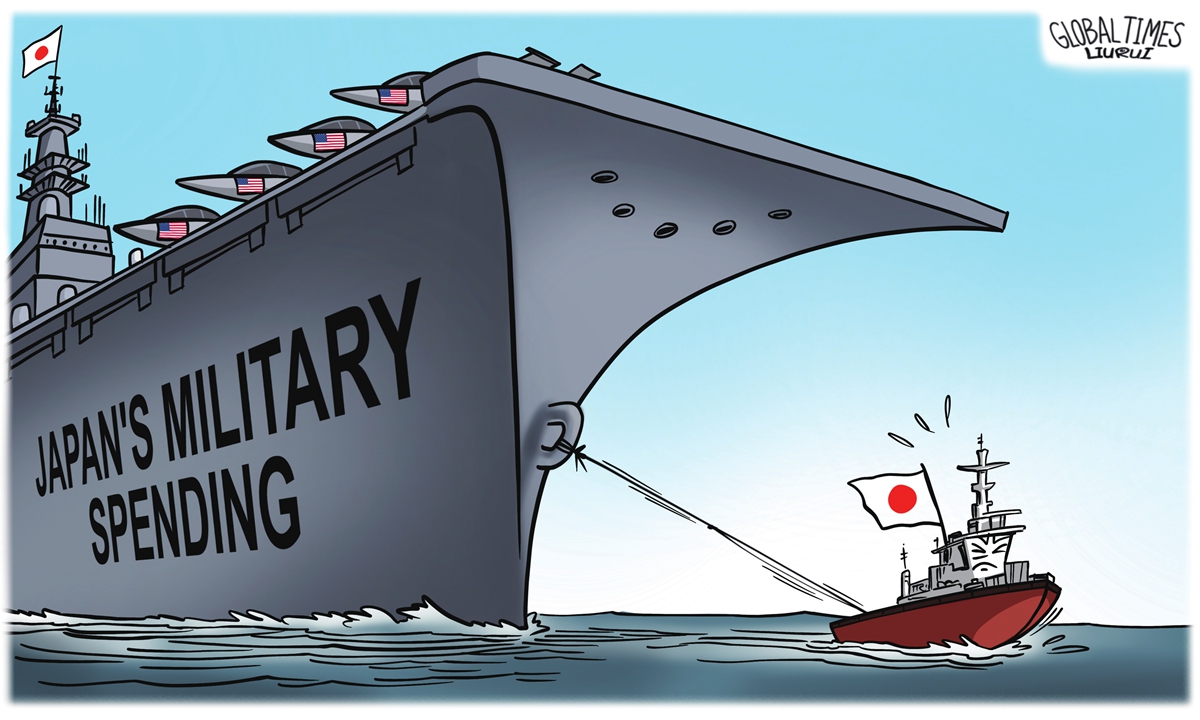Japan risks itself exploiting China-US rivalry for gains with record high military budget

Illustration: Liu Rui/GT
Japan's Defense Ministry has shockingly request nearly $50 billion for the 2022 fiscal year. If granted in full, this would amount to a 2.6 percent increase from the previous year, the largest annual increase since 2014. The military spending request lays out Japan's plans to build five military ships and a submarine, purchase 12 Lockheed Martin F-35 fighter jets, and develop a domestic fighter jet. The ministry also aims to install missiles to strengthen military capabilities around the country's southwest chain of islands near China's Diaoyu Islands.
Last year, Japan's Defense Ministry already secured a certain budget for the development of Japan-made standoff missiles, citing its need to respond to China's increasing naval activities around the islands in southwestern Japan.
Japan's intentions are clear: to counter China's defense budget growth in recent years and deal with China's military presence in the East China Sea and the South China Sea. Tokyo has been trying to secure all the necessary military equipment needed to defend the islands in its southwest. Therefore, it needs Washington's help. The way Tokyo uses its military seems to be changing and has surprised many in Washington. This has seen the canceling of the planned deployment of the Aegis Ashore ballistic missile defense system and talks about enemy base attack capabilities. Still, Tokyo has made strategic demands from Washington which will draw the two closer together.
For a long time, Japan's annual military expenditure had a threshold of no more than 1 percent of its GDP. As the budget keeps expanding on a yearly basis, it could possibly top the 1 percent limit. Japan has long wanted to get rid of such limits, but it is not capable according to current laws. In light of the postwar pacifist Constitution and against the backdrop of the COVID-19 pandemic, a big defense budget will generate public criticism. Hence, the Japanese government needs to play the "China card" and hype China's rise. This also means tossing out an "emergency" threat about a mainland "invasion" of Taiwan as a "reasonable" excuse for its military budget increase.
Japanese Defense Minister Nobuo Kishi told Nikkei in an interview in May that "We must increase our defense capabilities at a radically different pace than in the past," considering China's increased capabilities. In regards to the island of Taiwan, Kishi said Japan will "need to adjust to changes in the situation and make changes as needed."
A slew of Japanese politicians have made provocative remarks about Taiwan. Regarding the Taiwan question, Japan may increase focus on the following three aspects of defense increases. First, from the perspective of public opinion, Japan will hype what it calls the Chinese mainland's aggressive attitude toward Taiwan and portray the island as being bullied. By doing so, Tokyo aims to gain more domestic public support for its stance over Taiwan.
Second, Japan's ruling Liberal Democratic Party and the Democratic Progress Party of Taiwan just held an online 2+2 security dialogue on August 27 despite warnings from the Chinese mainland. It's likely that Tokyo will establish a series of security dialogue mechanisms with the island in the future.
Third, Japan may conduct joint military exercises with the US and island of Taiwan in some sensitive areas and fields. This is well worth the attention of the Chinese mainland at the highest levels.
Japan currently is still in the gray area between strategic autonomy and strategic affiliation. Japan believes that it if really wants to become a major power, it needs to display its tough military posture and independence in the areas of research and development of weapons and equipment. But the fact is Japan has been constrained in the framework of Japan-US alliance, and Tokyo cannot deviate from it. If a "major power" means a country that is independent of the US, the possibility for Japan to become such a power is small. Meanwhile, the US will never allow Japan to become a major power under the framework of Japan-US alliance.
Japan understands the nature of the strategic competition between China and the US well. Right now, the competition is controllable and unlikely to develop into a military clash. Therefore, Tokyo is tuned in to exploit the current China-US rivalry to seek gains. But Japan is well aware that it cannot benefit if a military clash breaks out between China and the US.
The author is an associate research fellow at the Center for Japanese Studies, Fudan University. opinion@globaltimes.com.cn


